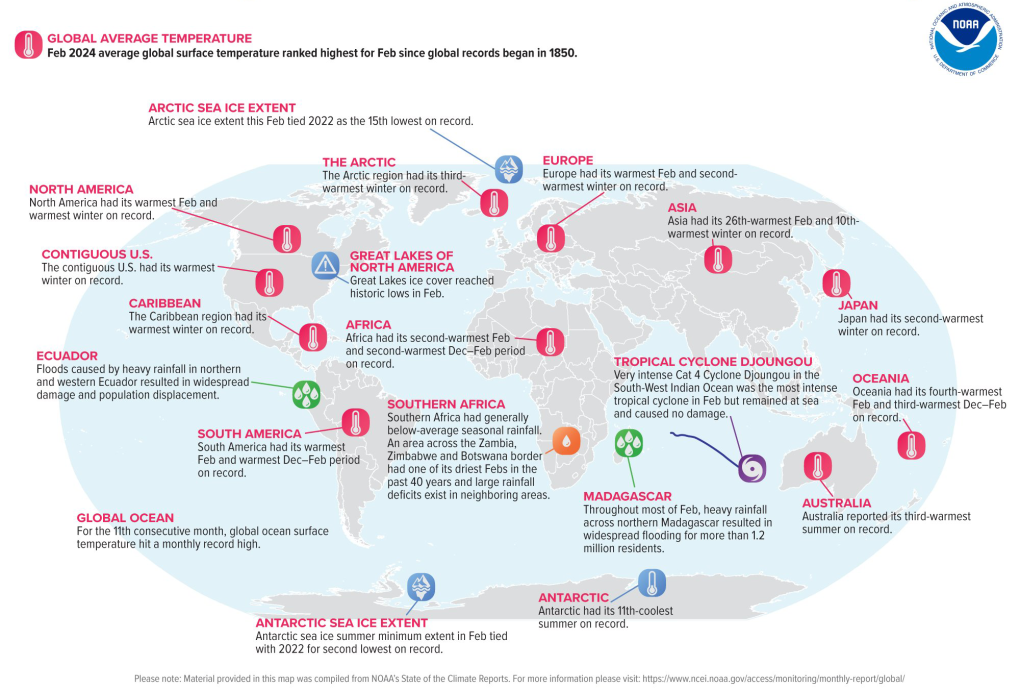Last winter rattled Bangladesh for a longer period with chilling teeth and now the heat wave gives us a high signal to grip. The weather is not maintaining grammar and all that is happening because of the severe impacts of climate change.
The year 2024 is poised to be a pivotal moment in environmental history, with climate scientists forecasting it to surpass all previous records as the hottest year globally. This unprecedented heat wave is not a standalone event but rather a manifestation of an alarming upward trajectory in global temperatures.
You Can Also Read: HOW TO SURVIVE THE HEATWAVE?
Following this, A severe heat wave is gripping the Dhaka, Khulna, Barishal, and Rajshahi divisions of Bangladesh. On Wednesday (April 3, 2024), Bangladesh’s highest temperature was recorded at 38.6 degrees Celsius. Temperatures are expected to surge up to 40°C over the next 72 hours starting Wednesday (April 3, 2024) according to an alert issued by the Bangladesh Meteorological Department.
The intensity of these heat waves is feared to increase further in the coming days. Mild to moderate heat waves are also sweeping across Rajshahi, Dhaka, and Khulna, and may spread, potentially exacerbating discomfort due to increased moisture incursion.
Conversely, brief rain or thundershowers accompanied by gusty winds are likely in Mymensingh, Sylhet, Kishoreganj, and Brahmanbaria, with isolated incidents of hail. Elsewhere in the country, weather conditions are expected to remain mainly dry with partly cloudy skies, while day temperatures may rise slightly and night temperatures remain nearly unchanged.
Amidst these environmental challenges, the need for comprehensive global cooperation and policy reforms becomes increasingly imperative.

Earth’s Temperature Soars Alarmingly
Since the dawn of the Industrial Revolution, Earth’s air temperatures have been on an upward trajectory. While natural variability plays a role, the overwhelming body of evidence points to human activities—particularly the emissions of greenhouse gases that trap heat—as the primary driver behind our planet’s escalating warmth.
According to ongoing temperature analysis spearheaded by scientists at NASA’s Goddard Institute for Space Studies (GISS), the average global temperature on Earth has risen by at least 1.1° Celsius (1.9° Fahrenheit) since 1880. The majority of this warming has occurred since 1975, at an alarming rate of roughly 0.15 to 0.20°C per decade.
The past nine years have been the warmest on record since modern recordkeeping commenced in 1880. The Earth has just experienced its hottest February ever, marking the ninth consecutive month to shatter all previous records, according to researchers.

Analysis of data from billions of readings, collected from satellites, weather stations, aircraft, and ships, reveals that February 2024 was 0.12 degrees Celsius (0.22 degrees Fahrenheit) warmer than the previous record set in 2016. Furthermore, it was a staggering 1.77 Celsius (3.19 Fahrenheit) warmer than the average temperature during pre-industrial times.
The impacts of this unprecedented warmth were witnessed globally in February, ranging from heavy rainfall causing extensive damage across Europe and the east and west coasts of North America, to drier-than-average conditions leading to droughts and wildfires in parts of Africa, Central Asia, South America, and Australia.
These new findings, serve as a stark reminder that the rapid warming of our planet is continuing unabated, necessitating urgent action to mitigate its catastrophic consequences.

Why Global Temperature Is Increasing?
Global warming, the long-term rise in Earth’s average surface temperature, is a complex phenomenon driven by a multitude of factors, both natural and human-induced. While natural causes, such as variations in the Earth’s orbit, volcanic activity, and changes in solar output, contribute to climate fluctuations, the primary driver of the unprecedented warming observed in recent decades is human activity.
The burning of fossil fuels (coal, oil, and natural gas) for energy production, transportation, and industrial processes is the leading cause of increased greenhouse gas emissions, particularly carbon dioxide (CO2). These gases trap heat in the Earth’s atmosphere, creating a greenhouse effect that amplifies global temperatures. Deforestation, agricultural practices, and other land-use changes also contribute to the release of greenhouse gases and the reduction of natural carbon sinks.
Furthermore, the release of other greenhouse gases, such as methane and nitrous oxide, from various human activities, including agriculture, waste management, and industrial processes, exacerbates the warming effect. Additionally, certain human-made pollutants, like black carbon and aerosols, can either absorb or reflect heat, further impacting the Earth’s energy balance.
Bangladesh: Frontline of Crisis
Climate change is a global issue, but its impacts will be particularly devastating and unbalanced for developing and underdeveloped economies. These countries lack adequate resources, science, and technology to adapt to the changing environment. Ironically, the people suffering the most are from least developed countries that have contributed the least to the problem of climate change caused largely by developed nations pursuing better lives.
Bangladesh stands out as an acute example, being one of the most endangered coastal countries due to global warming. If warming continues at the current rate, a large area could be flooded within 100 years, displacing around 30 million people as climate refugees. Despite emitting only 0.4% of global greenhouse gases, Bangladesh is projected to be among the top 10 countries most affected by climate change.
Its geographical location, overpopulation, poverty, and inadequate social security make Bangladesh increasingly vulnerable day by day. The economic impacts are gradually intensifying due to effects like erratic rainfall and rising temperatures. Without proper management, these climatic variables may become overwhelming for the nation in the future. The effects of climate change on sectors like agriculture, rising sea levels, extreme weather events, health impacts, and loss of ecosystems like the Sundarbans are posing severe threats to Bangladesh.
Global Cooperation Policy Impetus
Transition to Renewable Energy Sources:
By accelerating the shift from fossil fuels to renewable energy sources like solar, wind, and hydroelectric power and investing in clean energy technologies and infrastructure.
Improving Energy Efficiency:
By implementing stricter energy efficiency standards for buildings, transportation, and industries and promoting energy-efficient practices and technologies.
Reduce Deforestation and Promote Reforestation:
By protecting existing forests, which act as carbon sinks, and encouraging reforestation and afforestation efforts globally.
Sustainable Agriculture and Land Management:
By adopting sustainable agricultural practices that reduce greenhouse gas emissions and promoting sustainable land-use practices and agroforestry.
Reduce Waste and Promote Recycling:
By Implementing effective waste management strategies to reduce methane emissions from landfills and encouraging recycling and composting to minimize waste.
Promote Sustainable Transportation:
By Investing in public transportation, electric vehicles, and alternative fuels and encouraging walkable and bicycle-friendly urban planning.
International Collaboration and Policy Reforms:
Strengthen international agreements and policies to reduce greenhouse gas emissions and provide financial and technological support to developing nations.
Public Awareness and Individual Action:
By educating the public on the impacts of climate change and promoting sustainable lifestyles and encouraging individual actions like energy conservation and reduced consumption.
Beyond question, to develop the right ecological balance, the whole country needs millions of trees to grow and respective authority to the ordinary people, everyone must get engaged in this program cordially.


